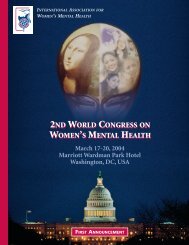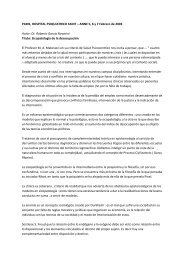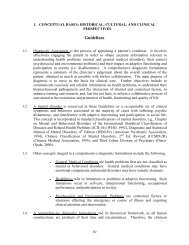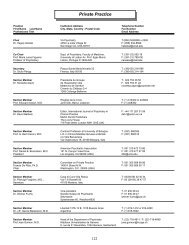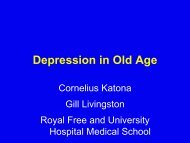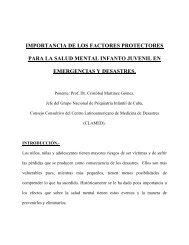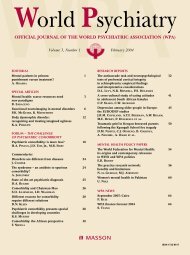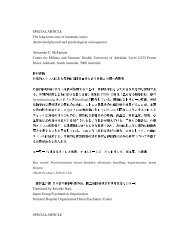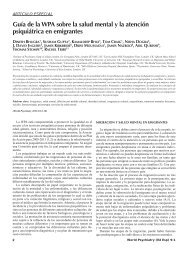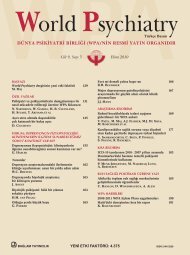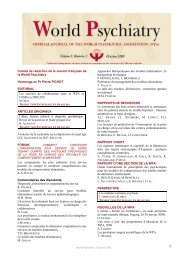ABSTRACTS - World Psychiatric Association
ABSTRACTS - World Psychiatric Association
ABSTRACTS - World Psychiatric Association
Create successful ePaper yourself
Turn your PDF publications into a flip-book with our unique Google optimized e-Paper software.
taken into account and mood disorders during the peri-partum are<br />
undermanaged and go untreated. As for post-partum depression,<br />
maternal responsibility and guilt often become the main issues highlighted<br />
in studies preoccupied by the impact of maternal depression<br />
on infant development. This workshop will focus on all these different<br />
aspects of psychiatric issues related to reproduction. A review of<br />
the literature, methodological issues and therapeutic management of<br />
all situations will be provided. A general comprehensive discussion<br />
encompassing reproductive women’s mental health issues will complete<br />
our presentation.<br />
SW4.<br />
HUMANITIES IN MEDICAL TRAINING<br />
AND IN THE HEALING PROCESS<br />
(organized by the WPA Section on Literature<br />
and Mental Health)<br />
Y. Thoret (Poissy, France), E. Sukhanova (New York, NY, USA),<br />
A. Rivas (Guadalajara, Mexico), S. Kato (Tochigi, Japan),<br />
E. Saad de Janon (Guayaquil, Ecuador), L. Küey (Istanbul,<br />
Turkey)<br />
Our Section intends to promote humanities and literature in medical<br />
education, in order to help medical students to develop their critical<br />
and analytical skills and to better understand the socio-cultural patterns<br />
of mental health and pathology. Many institutions of higher<br />
learning are now considering ways to incorporate studies in the<br />
humanities in their undergraduate curricula for medical students. Our<br />
Section is putting together a proposal for a core curriculum in medical<br />
humanities, including a multicultural suggested reading list, main<br />
learning outcomes and goals, and supplementary materials such as<br />
sample course syllabi. This workshop comments on three texts which<br />
could be presented to the students, dealing with treatment in psychiatry<br />
and, more precisely, the process of healing in this field of pathology.<br />
SW5/6.<br />
CULTURE, HUMOR AND PSYCHIATRY:<br />
A SYNTHESIS (Parts I and II)<br />
(organized by the WPA Section on Transcultural<br />
Psychiatry)<br />
R. Wintrob (Providence, RI, USA), M. Weiss<br />
(Basel, Switzerland), T. Akiyama (Tokyo, Japan), J.D. Kinzie<br />
(Portland, OR, USA), K. Bhui (London, UK), R. Bennegadi<br />
(Paris, France), P. Leung (Portland, OR, USA), L. Küey<br />
(Istanbul, Turkey), J. Obiols-Llandrich (Andorra),<br />
D.L. Mkize (Durban, South Africa), Y. Thoret (Poissy, France),<br />
M.R. Jorge (São Paulo, Brazil), S. Villaseñor Bayardo<br />
(Guadalajara, Mexico), H. Wahlberg (Stockholm, Sweden),<br />
S.O. Okpaku (Nashville, TN, USA), J. Cox (Stoke-on-Trent, UK)<br />
There is no culture that does not appreciate humor, and every culture<br />
expresses humor in unique ways. Humor has as its most fundamental<br />
purpose the relief of stress and anxiety. The situations that encompass<br />
humorous anecdotes are firmly rooted in every culture’s conceptions<br />
of human frailties, fears, longings and aspirations. Wishes for selfaggrandizement<br />
are balanced by fear of exposure and ridicule. Wishes<br />
for wealth, power, attractiveness and vigor are countered by the all<br />
too frequent realization that such wishes cannot be realized except in<br />
dreams and in humor. In this workshop, psychiatrists with experience<br />
in both clinical and cultural psychiatry in many parts of the world<br />
address the relationships between culture, humor and psychiatry in<br />
the cultures they know best. They use humorous anecdotes to illustrate<br />
what humor reveals about personality, personal and social conflict<br />
and its resolution, and how psychology and psychiatry provide a<br />
substrate and interpretative focus for the many-layered meaning of<br />
humor cross-culturally.<br />
SW7.<br />
WOMEN AND WORK STRESS<br />
(organized by the WPA Section on Women’s Mental<br />
Health)<br />
U. Niaz (Karachi, Pakistan), M.B. Rondón (Lima, Peru),<br />
D.E. Stewart (Toronto, Canada), A. Riecher-Rössler (Basel,<br />
Switzerland)<br />
Gender differences in work-related health conditions have been<br />
researched worldwide over the past two decades. An extensive and<br />
relevant literature on women’s work and mental health issues is now<br />
available. Paid employment, in particular, has been considered an<br />
important part of women’s living conditions, as the number of women<br />
entering the labour market has grown constantly over the past<br />
decades. As a matter of fact, occupation ranks sixth amidst the ten<br />
major risk factors for the global burden of disease that affect disproportionately<br />
women. According to <strong>World</strong> Bank estimates, from 1960<br />
to 1997, women have increased their numbers in the global labour<br />
force by 26%. Today, women make up about 42% of the estimated<br />
global working population, making them indispensable as contributors<br />
to national and global economies. This is true in developed and<br />
emerging countries. Women’s work is generally associated with better<br />
health. Nevertheless, as women have become more assimilated into<br />
the workforce, they have realized considerable changes in their traditional<br />
roles, which may contribute to health problems. In particular,<br />
the multiple roles that they fulfil in society render them at greater risk<br />
of experiencing mental problems than others in the community. Many<br />
studies seem to show that female workers may be exposed to some<br />
gender related stressors which could threaten their mental health and<br />
well-being. Fostering a good work-life balance will improve the possibilities<br />
for women and men to enjoy both work and family, without<br />
being forced to choose between the two.<br />
SW8.<br />
TREATMENTS FOR PREGNANT WOMEN<br />
WITH CHRONIC MENTAL DISORDERS<br />
(organized by the WPA Section on Perinatal<br />
Psychiatry and Infant Mental Health)<br />
J. Cox (Stoke-on-Trent, UK), N.M.-C. Glangeaud-Freudenthal<br />
(Villejuif, France), A.-L. Sutter-Dallay (Bordeaux, France),<br />
N. Garret-Gloanec (Nantes, France), G. Apter-Danon (Antony,<br />
France), O. Omay (Tain l’Hermitage, France)<br />
Treatments during pregnancy are an important issue because of their<br />
consequences, not only for women’s health, but also for the foetus<br />
and future infant’s development. The analysis of two different data<br />
bases about the prescription of psychotropic drugs during pregnancy<br />
will be presented and discussed. A review of literature will open a discussion<br />
on practical and ethical issues of chemotherapeutic treatment<br />
strategies, as well as other approaches, such as specific pregnancy<br />
psychoeducation. A European database (1032 mother-baby unit inpatients)<br />
will bring information on treatment received during pregnancy<br />
by women who were admitted with post-partum mental health disorders<br />
(mainly chronic psychotic disorders and affective disorders) in<br />
118 <strong>World</strong> Psychiatry 8:S1 - February 2009



